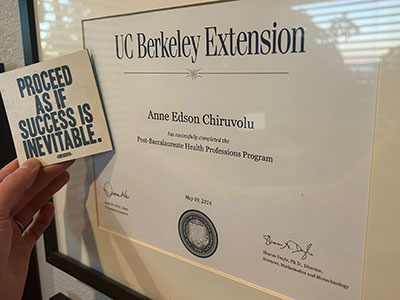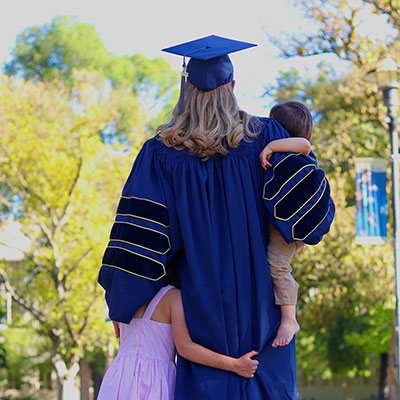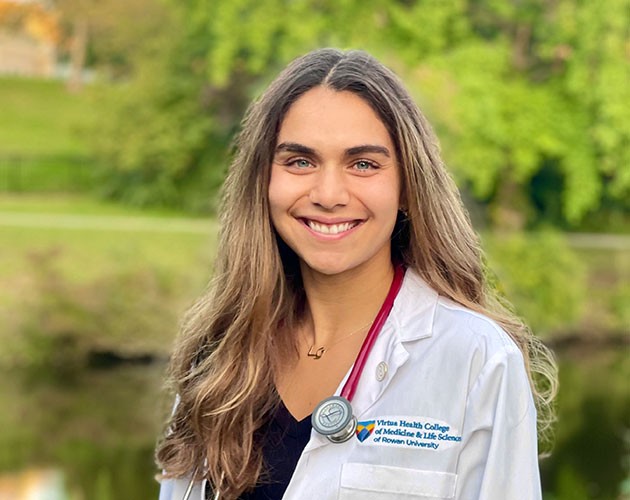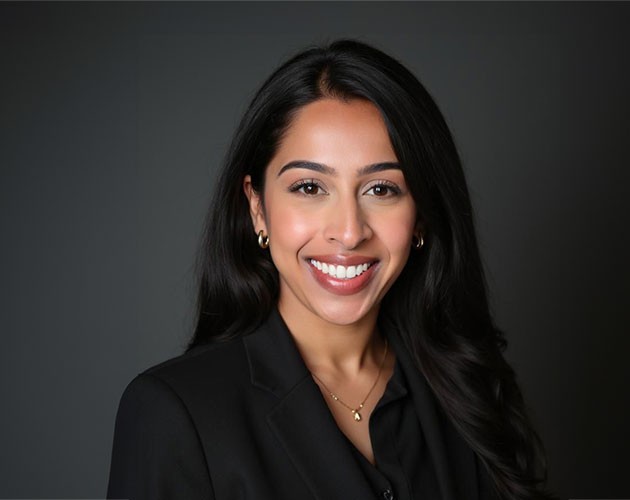From Pie in the Sky to Veterinary Medical School

When Anne Chiruvolu was growing up in Massachusetts, she knew her interest in life sciences and in animals would eventually lead to a veterinary career.
So she attended Johns Hopkins University for her undergraduate education because of the location, campus culture and its strong programs in life sciences—important for her goal to apply to veterinary school—and creative writing, which supported both her professional and personal interests.
However, the life sciences offerings created a slight road bump in Anne’s career path.
“I took some seminars in psychology during my freshman year and found them fascinating, and I ended up majoring in psychology,” she tells me. “As graduation approached, however, I realized I didn’t want to go into research or treat human patients.”
As in the case of many students who later seek a career change, Anne’s post-college career path wasn’t what she had originally envisioned. Yet, the dream of becoming a veterinarian never strayed far. “I wound up working in education after graduation. I loved working with students and helping them achieve their goals, but my strong interest in veterinary medicine never went away. When I had the opportunity to make a change and pursue a career in veterinary medicine, I took it.”
Let’s look at how she ended up where she is today: an associate veterinarian at Redwood Veterinary Hospital, a six-doctor private practice in the San Francisco Bay Area.
First Stop: San Diego
Anne was a young teen when she began volunteering at MSPCA-Angell, cleaning cages and walking dogs. At age 14, she was working every weekend and school vacation as an animal caregiver and adoption counselor until she was off to attend Johns Hopkins.
“It is still one of the most fun jobs I have ever had!” she effuses.
Anne came to California right after graduating from college with her then-boyfriend, now-husband, who also graduated from Johns Hopkins and who had been accepted to law school at the University of San Diego (USD).
“I was offered a job in USD’s School of Leadership and Education Sciences (SOLES),” she says.
“After a year, I was offered a promotion to the director of Admissions and Outreach, but it was contingent upon me earning a master’s degree. Fortunately, I was offered a place in SOLES’ M.A. in Higher Education Leadership program.”
For the next two years, Anne was earning her degree in night classes and writing a thesis, learning how to run a department, counseling students, and coordinating recruitment and admissions for about 20 different graduate programs. And although it was a really busy time for her—bringing the school’s enrollment to a record high, no less—she still managed to carve out time to volunteer walking dogs and rehabbing wildlife on the side.
“I couldn’t stay away from the animals!” she admits.
Next Stop: San Francisco Bay Area
In 2013, after Anne’s partner graduated from law school, they decided together that a move to the Bay Area was the best next step for them.
“He took a position working at a firm in Palo Alto,” she relates, “and I was job searching in higher education in the area while continuing as a remote consultant for my previous employer.”
However, Anne found she couldn’t get excited about the positions she was interviewing for.
“I had always wanted to become a veterinarian but I was getting farther and farther away from that dream,” she recalls.
“My partner really encouraged me to think about making a change, and bolstered my confidence when I felt worried that I didn’t have what it would take to succeed. Once I made the decision to change my career path, I instantly felt a big rush of excitement and hope.”
She began researching veterinary school entrance requirements and it became clear she would need to take additional coursework in order to apply.
Of the post-baccalaureate options in the Bay Area, Anne chose us because of the quality of the courses and instructors, the flexibility of the schedule, the guidance and the structure offered by our Post-Baccalaureate Health Professions Program, including our program advising.
“As someone who previously worked in education, I appreciated that someone was willing to sit down with me and outline the process and steps I needed to take in order to succeed,” Anne commends.
The UC Berkeley Extension Experience
Like many students returning to a college-level learning environment after years away from the classroom, Anne was nervous about being able to grasp the material.
“My two semesters of physics and organic chemistry stand out; the instructors were really incredible teachers. Jay Parrish, who is an organic chemistry instructor, came from industry so he was focused on practical applications, which made the material feel much more ‘alive.’ It was still hard work to succeed, but it never felt insurmountable.
“I did take one online course, Genetics, as part of the program,” she adds. “It was more convenient for my schedule because I had a newborn at the time.”
In addition to the courses she needed for her application to veterinary medical school, Anne completed the Health Careers Seminar II, which helped her with the application and interview process. (This seminar has since been broken down into three separate Health Careers II seminars.)
Regardless of which health profession, the post-baccalaureate program science courses apply to a wide range of medical and professional schools. While students are on individual career paths and come from different educational and professional backgrounds, they do share common experiences and goals, enhancing in-person and online classroom learning.

“There wasn't a formal cohort, but I did fall in with a group of students who were taking the same courses in order to apply to professional school,” Anne says. “Most of them were planning to apply to human medical school or physician assistant programs, not veterinary school, but the coursework was the same. They were a friendly, ambitious and interesting group of people. We bonded over our shared goals. It was great to see familiar faces in my courses and have the opportunity to study together.
“It was also reassuring to talk with other people on the same path as most of us were career changers who had been out of school for a while. All of us were successful in getting accepted into our programs of choice, and I'm still in touch with some of them, now that we're all doctors.”
But to succeed in applying to veterinary medical school, you need more than just the right courses; you need to have completed a minimum number of hours working or volunteering in the field.
“So many aspiring vets have a ‘pie in the sky’ idea of what it will be like,” Anne says, “and veterinary schools want to ensure applicants understand the realities of the work.
“While I was in the post-bacc health program, I was also working at UNI Pet Clinic as a paid veterinary assistant in the East Bay. I learned so much about the field and it further solidified my desire to pursue admission to veterinary school. In addition, I volunteered at both the Peninsula Humane Society & SPCA and the City of San Jose Animal Care Center spay and neuter clinics for additional experience.”
Not only was Anne busy in the Bay Area helping animals, but she also got an opportunity to be a month-long extern at Lisbon Veterinary Clinic (Lisbon, Ohio), assisting at dairies, equestrian training facilities and small farms, and providing preventative and urgent care for horses, cattle, goats and hogs.
“Vet schools like to see applicants with varied experiences in veterinary medicine,” Anne explains, “and I didn't have much experience with rural medicine or large-animal medicine —horses, cattle, hogs, et cetera.
“One of my cousins in Ohio connected me with the veterinarians who treat his livestock, and they were kind enough to take me on for a few weeks of ride-alongs. They do a lot of work on dairies, horse farms and with Amish farmers, and it was great to learn more about that. It's a different kind of medicine when you're treating animals that are part of a person's livelihood or that are responsible for feeding their family. The first farm call I went on was for a dairy cow with severely low calcium levels, which can happen when their milk comes in after calving. The vet was able to save the cow's life, and the owner was so thankful because that cow provided milk for his whole family, which included six or so children. The entire experience in Ohio was incredibly rewarding and eye-opening.”
With externships and other professional growth opportunities during her time in the Post-Baccalaureate Health Professions Program, Anne was busy. So how did she manage it all?
“In terms of time management, my first priority during my post-bacc was making the grades I would need in order to be admitted to veterinary school, so I made sure to schedule my other obligations part time and allow for plenty of time for studying and commuting. I also had my first child around the time I was taking the GRE and submitting my vet school application. I was busy—but I like to be busy—and it was honestly good preparation for vet school, which is often aptly described as ‘drinking from a firehose’ in terms of the amount of knowledge you're expected to acquire in a short period of time.”
All the while her eyes were set on the prize—admission to the University of California, Davis, School of Veterinary Medicine.
Destination: UC Davis School of Veterinary Medicine
“Ultimately I applied to only one vet school: UC Davis,” Anne states.
“The location and in-state tuition made it the only realistic option for my partner, child and me. It was nerve-wracking only applying to one vet school, especially because it was—and still is—the No. 1 ranked vet school in the country. The admissions office was very up-front about the GPA and GRE scores they expected from applicants, so I felt I had a pretty good shot.
“The post-bacc program assisted me by writing a composite letter of recommendation, running seminars on the application process and by doing mock multiple mini interview (MMI) sessions, which were really helpful preparation. Fortunately, I was admitted on my first try.”
Just like during her post-bacc experience, Anne weaved in externships to broaden her knowledge about veterinary medicine.
“During my first three years of veterinary school I was involved in a few extracurriculars and did a number of summer externships, which allowed me to explore areas of veterinary medicine I had less exposure to, such as theriogenology, exotic animal medicine and laboratory animal medicine,” says Anne.
“Fourth-year students enter the teaching hospital and spend about 14 months diagnosing and treating real patients alongside veterinarians from a variety of specialities, including cardiology, neurology, ophthalmology, surgery, emergency and primary care. My externships were a lot like fourth-year rotations, but done during years 1 through 3, with less autonomy than a fourth-year student would have.”
Despite not taking part in as many extracurriculars as some of her other classmates—she commuted roughly two hours a day during vet school in addition to caring for her young children—Anne’s focus on family and grades paid off. She earned a doctorate in veterinary medicine (DVM) and graduated with academic honors and a great job offer.
Coming Full Circle
“I achieved my career goal of becoming a general-practice veterinarian!” enthuses Anne.
“My focus is on treating dogs and cats, though I have the flexibility to extend my focus into other small mammals, reptiles and/or birds as time goes on. When I began my professional training, my goal was to obtain a position like this one, and I look forward to continuing to grow and learn at this practice.”

So what could be next for someone like Anne who has dreamed of becoming a veterinarian for so long?
“After graduating from vet school at UC Davis, roughly half of the newly minted vets go directly into general practice, the way I am doing,” Anne tells me. “The majority of the remaining half pursue additional training through internship or residency, which is required in order to become a specialist. A smaller percentage go into Ph.D. or master's programs, policy work, public health or other areas.
“I really enjoy general practice, and at this time I am not pursuing a board specialty, such as veterinary cardiology or dermatology. Though an exciting thing about the DVM degree is the fact that there are many future possibilities available if I should develop an interest that I want to pursue further.”
When asked about what advice she would give to others hesitant about pursuing professional health professions school after years away from the classroom, Anne says this:
“I would encourage anyone interested in making a career change to not let fear of failure hold them back. Be smart, do a lot of research, talk to people in the field you're interested in and make a realistic plan to achieve your goals. Keep costs in mind, and make a plan for how you will finance your plan, as educational debt is a huge issue, particularly in veterinary medicine. And once you have your plan in place, commit to it!”
Her motivation to stay committed to getting her dream job? Her family support system and a fridge magnet.
“I have had a magnet on my fridge for about 10 years—since I started planning my big career change,” relates Anne. “It says, ‘Proceed as if success is inevitable.’ It's something my husband would say to me when I was worried that I didn't have what it takes to get to where I am now. There's no magic to it; people are not born knowing how to do physics or organic chemistry or medicine. It's a matter of working hard—sometimes, really, really hard. And of course, I couldn't have gotten here without the support of my family—something I never lose sight of.”


